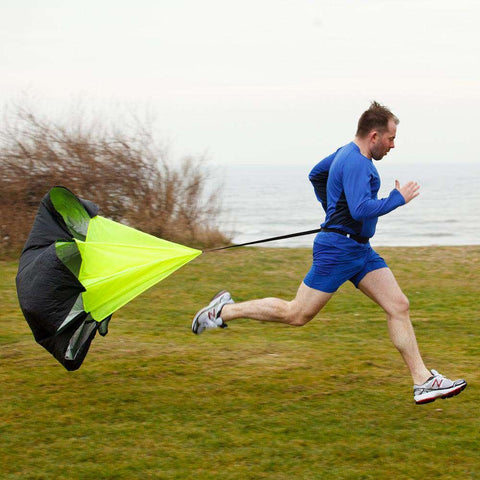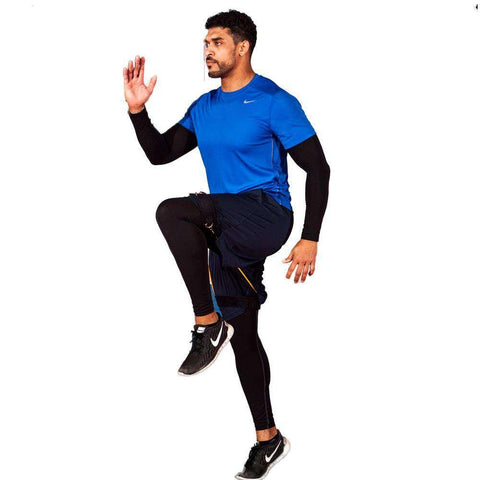Embark on your wellness journey with this comprehensive Speed Training Guide to enhance your athletic abilities through various exercises designed to boost your speed, strength, and agility.
Speed training is crucial for athletes looking to improve their performance by developing explosive power in the lower body. It includes a range of exercises focusing on acceleration, deceleration, quickness, and agility, aiding in muscle recruitment and fatigue reduction.
Discover the benefits of speed training, including enhanced athletic ability, injury prevention, and efficient cardio workouts, to elevate your fitness levels and overall health. Explore six types of speed training, including agility, strength, fartleks, interval running, plyometrics, and running drills, each with unique benefits to help you reach your full potential. Master these six speed training exercises to unlock your full potential and take your athletic abilities to the next level.

How-to Guide for Speed Training
An necessary part of a speed training program is to start with proper techniques and form. Engage in a dynamic warm-up to prepare your muscles for the intense workout ahead. Incorporate a variety of speed drills such as agility training, strength training, interval running, and plyometric exercises to improve your overall speed and performance. Focus on proper nutrition and hydration to support your workouts and aid in recovery. Remember to listen to your body, rest when needed, and gradually increase the intensity of your speed training to avoid overtraining and injuries.
Tips for Starting with Speed Training
- Start with a dynamic warm-up before your speed training session to prepare your muscles.
- Gradually increase the intensity and duration of your speed workouts to avoid overexertion.
- Include a mix of speed drills such as agility training, strength training, and plyometric exercises for a well-rounded training routine.
- Focus on proper form and technique to maximize the effectiveness of your speed training program.
- Rest and recover adequately between speed training sessions to allow your body to adapt and grow stronger.
Thou should always consult with a fitness professional before starting a new speed training program to ensure it aligns with your fitness goals and abilities.

Factors Influencing Speed Training Programs
- There's no one-size-fits-all approach to speed training programs, as individual factors such as age, fitness level, and training goals can influence the program design.
- This requires a personalized approach to tailor the speed training program to meet the specific needs and abilities of the individual.
- Programs should aim to progressively overload the body to stimulate adaptations and improvements in speed, power, and agility.
This customized approach helps optimize performance gains and minimize the risk of injuries by considering the unique characteristics of each individual athlete.
Key Takeaways:
1. Speed training offers multiple benefits, including improved athletic ability, injury prevention, and efficient cardio workouts.
2. There are various types of speed training, such as agility training, strength training, fartleks, interval running, plyometric exercises, and running drills, each serving different purposes to enhance speed and performance.
3. Incorporating a variety of speed training exercises into your routine can help you develop explosive power, increase speed-strength, and work on quickness and agility, ultimately boosting your overall athletic performance.

Enhancing Your Speed Training Techniques
Tips for Maximizing Agility Training
For athletes looking to maximize their agility training, it's necessary to focus on quick bursts of movement and coordination. Incorporating ladder drills, cone drills, and shuttle runs can help improve footwork, change of direction, and overall agility. Ensure to maintain proper form and technique throughout each drill to reap the full benefits. Assume that consistency and dedication to agility training will yield significant improvements in your athleticism.

How to Incorporate Strength Training for Speed Enhancement
Maximizing your speed enhancement through strength training involves incorporating explosive exercises like squats, deadlifts, and power cleans into your workout routine. These compound movements target multiple muscle groups simultaneously, helping to build strength and power in your legs. Incorporate plyometric exercises like box jumps and medicine ball throws to further develop explosive strength. Even adding resistance bands to your routine can help improve overall muscle activation and speed. Combine strength training with speed drills to see significant improvements in your performance on the field or track.
Advanced Speed Training Strategies
- Not Overtraining:
| Overtraining can lead to decreased performance and increased risk of injury. | Make sure to include adequate rest and recovery time in your training regimen. |
- Dynamic Warm-ups:
| Incorporate dynamic warm-up exercises to prepare your body for the demands of speed training. | Dynamic stretches and movements can help improve flexibility and range of motion. |
- Mental Training:
| Visualize success and focus on your goals during speed training sessions. | Mental training can help enhance performance and build confidence. |

Tips for Effective Fartlek Running
- Experiment with different paces and intensities during your fartlek runs to keep your body challenged and engaged.
- Stay mindful of your form and breathing while adjusting your speed throughout the run.
Advanced: Fartlek running is a versatile speed training method that allows you to personalize your workouts based on how you feel during each session. By incorporating varied speeds and intensities, you can improve your overall running performance and endurance. Perceiving your body's responses to different speed intervals is key to maximizing the benefits of fartlek running.
How to Utilize Interval Running for Peak Performance
Tips: Interval running can be a powerful tool for enhancing speed and endurance. By incorporating short bursts of high-intensity sprints followed by active recovery periods, you can improve your cardiovascular fitness and running pace. Consistency and progression are necessary for optimizing your interval running workouts.
Plyometric Exercises for Explosive Speed: A How-to Guide
Some: Plyometric exercises are effective for developing explosive speed and power. By incorporating exercises like box jumps, lateral jumps, and dot drills into your training routine, you can enhance your lower body strength and agility. Speed and explosiveness are crucial for athletic performance, making plyometric training a valuable addition to your speed training regimen.

To Safety and Injury Prevention in Speed Training
Tips for a Safe Workout Routine
With any workout routine, safety should always be a top priority. To ensure a safe speed training workout, consider the following tips:
- Warm up adequately before starting your speed training session to prepare your muscles and reduce the risk of injury.
- Hydrate properly and take breaks as needed to prevent overheating and dehydration.
- Listen to your body and avoid pushing yourself beyond your limits to prevent overtraining and potential injuries.
- Cool down and stretch after your speed training session to promote muscle recovery and flexibility.
After completing your workout, reflect on how your body feels and adjust your training intensity and frequency as needed to prevent burnout and stay injury-free.
Key Factors in Avoiding Injuries During Speed Training
On your journey to improving your speed and agility, it's crucial to prioritize injury prevention. To avoid injuries during speed training, consider the following key factors:
- Assume that proper form is important for every exercise to prevent strain on your muscles and joints.
Speed training can be intense, so it's vital to listen to your body and respect its limits to avoid overuse injuries or burnout. By following these key factors, you can stay focused on your fitness goals while keeping safety at the forefront of your training regimen.
To wrap up
Hence, speed training is a crucial component for athletes looking to enhance their performance by increasing their speed, agility, and power. By incorporating various types of speed training exercises like agility training, strength training, fartleks, interval running, plyometric exercises, and running drills, athletes can develop explosive power in their lower body, improve their cardiovascular health, and reduce the risk of injuries. With the right guidance and consistent practice, individuals can unlock their full athletic potential and take their performance to the next level. So, whether you're a runner, a basketball player, or a soccer athlete, integrating speed training into your workout routine can help you reach your goals and excel in your sport.
FAQ
Q: What is speed training?
A: Speed training involves various exercises aimed at helping athletes develop explosive power in the lower body. It includes drills to improve acceleration, deceleration, quickness, and change of direction.
Q: What are the benefits of speed training?
A: Speed training improves athletic ability by enhancing agility, power, and speed. It also helps prevent injuries by training the body to react quickly. Additionally, speed training provides an efficient cardio workout, similar to high-intensity interval training (HIIT).
Q: What are the different types of speed training?
A: There are six main types of speed training: Agility training, Strength training, Fartleks, Interval running, Plyometric exercises, and Running drills. Each type focuses on different aspects of speed and overall athletic performance.




































































